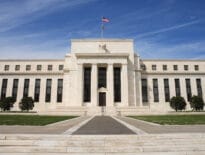
The former Boston State Hospital under demolition in 1997. The latest phase of its redevelopment depends on a $21 million financing deal with Silicon Valley Bank. Photo courtesy of the Boston City Archives
Silicon Valley Bank’s failure is creating a potential gap in financing for Massachusetts affordable housing projects and risks for commercial landlords that have a concentration of tech and life science tenants.
From mortgages for luxury condominiums at One Dalton to financing for affordable housing projects, Silicon Valley Bank has been an active lender in Boston’s real estate and development markets.
“There’s [low-income housing tax credit] investments, there’s construction loans, there’s developers who are scheduled to close this week, next week in the future. Those are all unknowns right now” said Rachel Heller, CEO of Boston-based Citizens Housing and Planning Assoc.
On Friday, as the FDIC was seizing the bank’s $209 billion in assets, local developers closed on $21 million in financing from SVB for a Mattapan mixed-income housing project.
New Boston Fund and Dorchester-based Lena Park Community Development Corp. are partnering on the latest phase of the $200 million Boston State Hospital redevelopment. The SVB construction loan will pay for an 80-unit mixed-income condominium project scheduled to break ground in April, New Boston Fund CEO Timothy Medlock said.
SVB syndicated the loan to several other institutions, Medlock said.
“We’ve been told [SVB] intends to be there and fund the commitment,” he said Tuesday morning. “This is a type of loan that is highly competitive and banks love to have this type of financing program on their books, so we always have significant demand among lenders when we look for financing.”
The FDIC issued an announcement Tuesday afternoon saying that the bridge bank – the government-owned entity that assumed control of SVB after the FDIC acted Friday – ” is obligated to and has the full ability to make timely payments to vendors and counterparties and otherwise perform its obligations” under contracts like mortgages and other legal agreements that Silicon Valley Bank entered into before its dissolution.
Projects Were Expecting Investments
Another wrinkle to the SBV saga: Massachusetts nonprofit community development corporations, which play a key role in affordable housing creation, are among major recipients of SVB’s $11.2 billion community benefits plan.
Announced in May 2021 following SVB’s acquisition of Boston Private Bank and Trust – itself an active lender to nonprofits – the five-year plan included $4.8 billion in Community Reinvestment Act loans and investments and $1.3 billion in residential mortgages for low- and moderate-income homebuyers.
The bank also increased participation in the Massachusetts Housing Partnership’s ONE Mortgage program, which provides low down payment mortgages for first-time homebuyers.
Madison Park Development Corp. is relying on low-income tax credits to be purchased by SVB to provide equity for a 96-unit housing project at 2085 Washington St. in Roxbury. CEO Leslie Reid told The Boston Globe the nonprofit may need to seek additional public subsidies to advance the deal.
“This is a great opportunity for other banks, national or local banks in Massachusetts, to step up and make some loans [to affordable projects],” Heller said. “We hope there’s a smooth transfer to another bank and the terms can be continued close to or the same as what they were.”
Life Science Landlords Face Questions
Silicon Valley Bank’s role in bankrolling tech startups has immediate effects upon commercial landlords that have a concentration of tech and biotech companies in their portfolios. Landlords often require letters of credit from early-stage companies as security when signing leases.
The nation’s biggest life science landlord, Alexandria Real Estate Equities, has $108.3 million in letters of credit pledged by SVB for tenants, according to an SEC filing. Landlords are unable to draw upon letters of credit while the FDIC draws up a SVB recovery plan.
Alexandria said it “will be working with [SVB clients] to replace their letters of credit with another acceptable security deposit as required under their lease agreement.”
Alexandria said it has only one SVB affiliate as a tenant, at an undisclosed Greater Boston property, that pays $1.7 million in annual rent.
The bank’s failure also could have an effect upon commercial investment sales activity and prices.
In a research brief, brokerage Marcus & Millichap said the bank’s collapse will prompt additional due diligence and tighter requirements on commercial lending. That could aggravate the “expectations gap” between sellers and potential buyers of commercial properties
“Smaller banks will be under particular scrutiny, which may generate additional headwinds for investors reliant on financing from smaller institutions,” the advisory states.
Banker & Tradesman staff writer James Sanna contributed to this report.
This story was updated at 3:53 p.m. March 14, 2023 to include an announcement from the FDIC.








